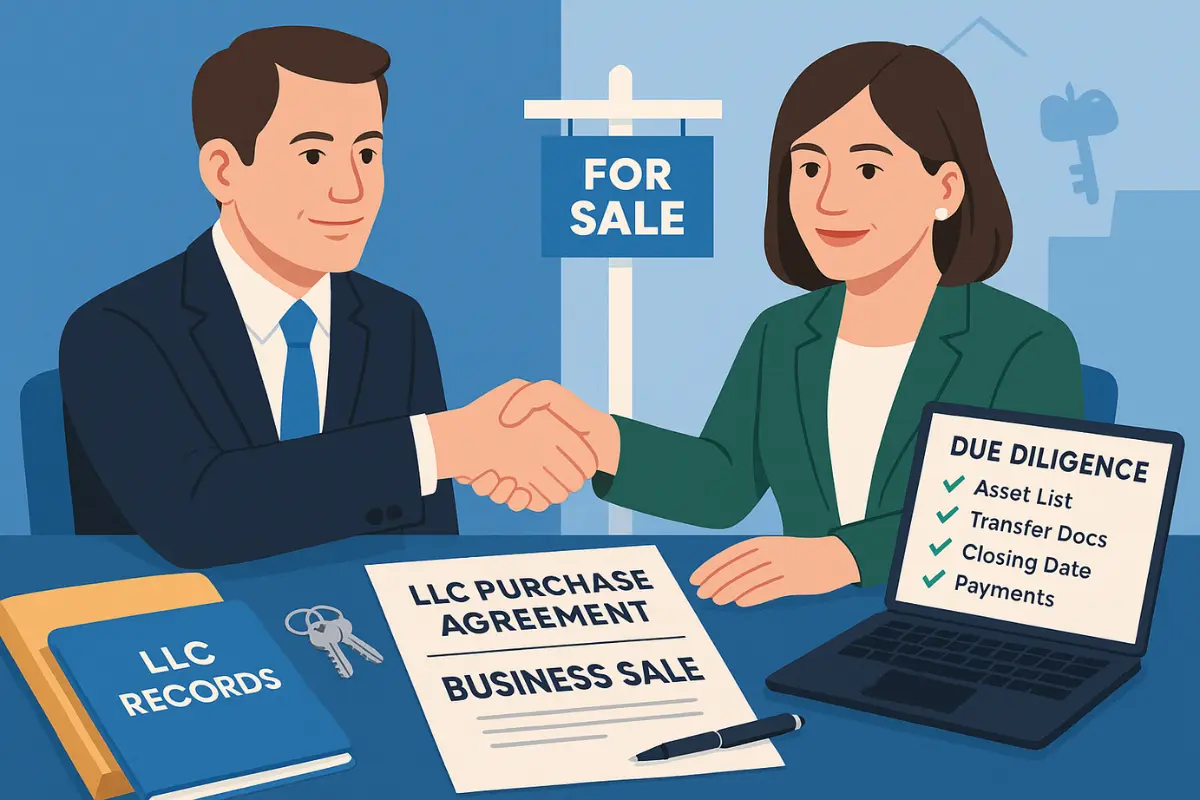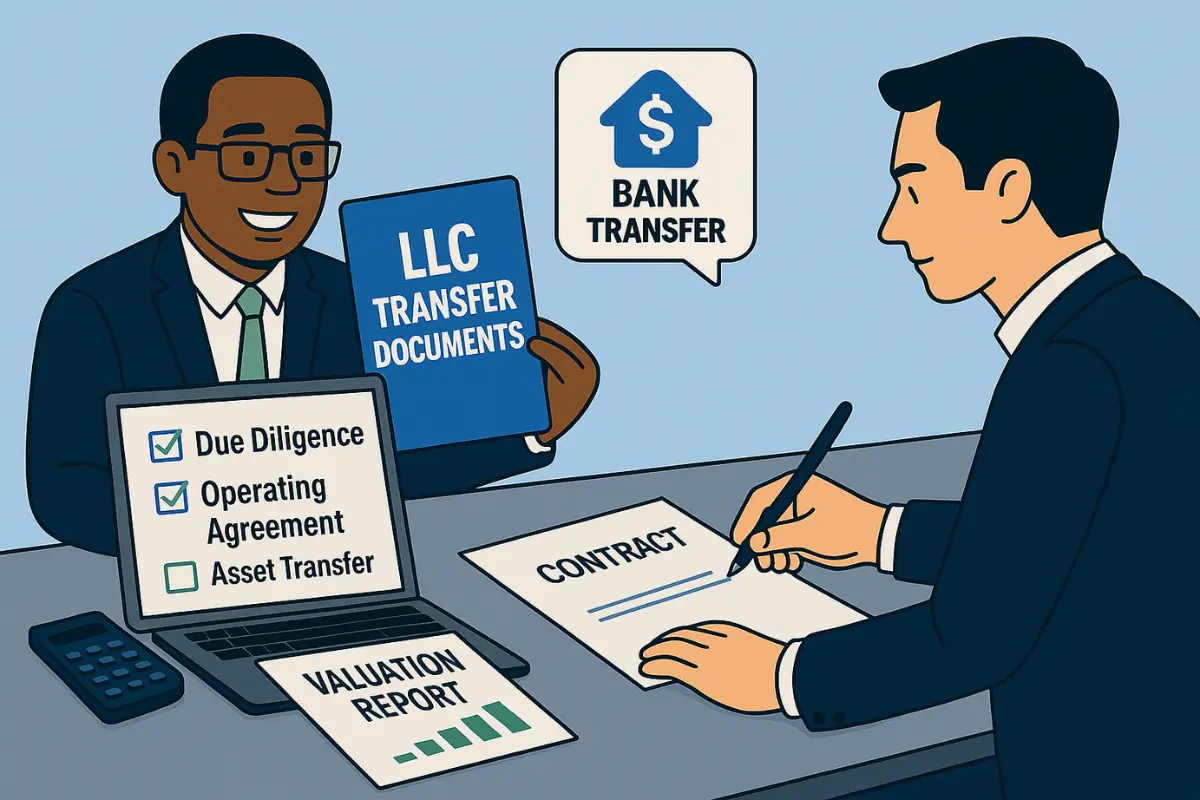Can You Sell an LLC? What to Know First

Selling your limited liability company can be a smart financial move, but it's more complex than it appears, with several critical aspects LLC owners must consider to maximize their sale. Transferring LLC ownership involves unique legal, operational, and financial factors that are often overlooked, including the risk of unexpected tax consequences. With careful planning, you can navigate these complexities and get the most from your sale.
Whether you're selling the entire business, transferring a partial ownership stake, or choosing between selling membership interests versus the company's assets, these transactions are common and well-established. Each option carries different implications, and understanding these differences is crucial.
This guide will walk you through the key details of selling an LLC, highlighting important steps and considerations to help you approach the process with confidence and protect your financial interests.

Can an LLC Be Sold Like a Traditional Business?
Can you sell an LLC? Yes, absolutely. While an LLC can be sold, the process differs significantly between an LLC and a corporation. The flexibility that makes LLCs appealing also means ownership transfers have unique considerations. Unlike corporations with standardized stock, LLC sales usually involve transferring ownership or membership interests as outlined in the company's operating agreement and governed by state laws.
Depending on your goals, the sale may involve selling the entire business, transferring partial ownership, or selling specific business assets instead of membership interests. This flexibility allows LLC owners to tailor the sale to their needs, but it also requires careful attention to the structure and legal framework governing the LLC.
Understanding LLC Ownership Structure
LLC ownership is divided into membership interests, which represent each member's percentage of ownership in the company. These interests define the rights members have to profits, losses, and decision-making authority within the LLC. Your ownership percentage determines your share of income, losses, and distributions.
Single-member LLCs have a simple structure where one person holds 100% of the membership interest. In contrast, multi-member LLCs divide ownership among multiple members based on their capital contributions or agreements. The LLC's operating agreement typically outlines each member's ownership percentage and details the procedures for transferring membership interests. For example, if an LLC has three members, the operating agreement may specify that their ownership is split 40%, 35%, and 25%.
According to the U.S. Small Business Administration, "LLCs can have a limited life in many states. When a member joins or leaves an LLC, some states may require the LLC to be dissolved and re-formed with new membership — unless there's already an agreement in place within the LLC for buying, selling, and transferring ownership."
This flexible ownership structure allows LLCs to tailor rights and responsibilities to the specific needs of the business and its members, offering more customization than traditional corporate stock structures.
Member Interests vs. Business Assets
When selling an LLC, you face two distinct options: transferring LLC ownership interests or selling the company's business assets. Transferring ownership interests means selling your stake in the LLC itself, thereby transferring your membership rights and obligations under the existing operating agreement. This approach generally results in a cleaner transaction and often provides favorable tax treatment, as proceeds may be taxed at capital gains rates rather than ordinary income.
On the other hand, selling business assets, such as equipment, inventory, and customer contracts, gives the buyer more control over what they acquire. However, asset sales typically involve more complex documentation, can result in higher tax liabilities for appreciated inventory and other assets, and may require dissolving or restructuring the original LLC. Choosing between selling LLC ownership interests or business assets requires careful consideration of liability, taxation, and transaction complexity from both the buyer's and seller's perspectives.
Selling vs. Transferring Ownership: What's the Difference?
Selling LLC ownership involves a financial transaction where you receive payment, usually marking a full or partial exit. Transfer of ownership can include sales but also covers non-sale transfers like gifts or succession planning among existing members.
This distinction matters for tax and legal reasons. Sales typically trigger immediate capital gains taxes, while transfers, especially in family succession situations, may have different tax treatments. According to CFO Consultants, an accounting and tax advisory firm, "Transferring ownership of your LLC can trigger a strategic realignment of assets, potentially mitigating tax liabilities and optimizing your financial position. Depending on the chosen transfer method—whether through sale, gift, or other mechanisms—you may capitalize on favorable tax treatment, thereby maximizing wealth preservation and enhancing overall financial security."
Understanding these differences helps members choose the best option for their situation, whether an external sale or an internal transfer among existing members. The tax planning opportunities available through different transfer methods can significantly impact your net proceeds and long-term financial goals.
Common Scenarios Where LLC Ownership Changes
LLC ownership changes arise in a variety of common situations, each requiring distinct approaches and preparations. Understanding these scenarios helps ensure you are ready to meet the specific legal and procedural requirements tied to your ownership transfer goals.
Typical situations include full business sales, bringing in new investors, removing departing members, and internal restructuring to optimize operations. Each circumstance involves different legal steps and adherence to the LLC's operating agreement, which often governs how ownership shifts are handled.
Full Sale of the LLC (Assets and Operations)
A full sale involves transferring either all membership interests or the entire business to a new owner, usually when the current owner wants to exit completely and hand over all operations. When selling the entire LLC, you must decide whether to structure the deal as a membership interest sale or an asset sale.
A membership interest sale transfers ownership while maintaining the existing LLC structure, making the buyer the new owner of the LLC itself. In contrast, an asset sale involves dissolving the LLC and selling individual company components, such as equipment, inventory, and intellectual property, to the buyer's entity.
State filing requirements vary but typically include submitting amended documents when significant ownership changes occur. Additionally, some states require extra steps, such as notifying creditors or publishing notice of the sale, to complete the full sale process legally.
Partial Sale or Transfer of Member Interests
Partial ownership transfers allow you to sell or transfer a portion of your membership interest while retaining involvement in the LLC. This approach is often used to reduce ownership stakes, bring in new capital, or add partners without a complete exit.
A partial sale or transfer of LLC member interests requires careful consideration of how it affects voting rights, profit distributions, and the LLC's ownership structure going forward. Your LLC's operating agreement typically outlines whether other LLC members have a right of first refusal and specifies approval processes governing such transfers.
Understanding these factors ensures smooth transitions and helps prevent disputes about management control or financial entitlements among members.
Exit of One Member in a Multi-Member LLC
When one member leaves, the departing member's ownership interest must be addressed through buyout provisions or external sales outlined in the operating agreement. A well-drafted buy-sell agreement establishes a valuation method, payment terms, and procedures for these transitions.
According to Ward and Smith, a business law firm, "A shotgun/buy-sell provision allows a member to initiate a buyout process by offering to either buy the other member's (or members') interest at a specified price or sell their own interest using the same pricing methodology." This mechanism ensures fair pricing since the initiating member doesn't know whether they'll end up as the buyer or seller.
The departing member's exit can trigger mandatory buyout provisions requiring other members to purchase the leaving member's share at fair market value. Professional business valuations help establish market value using objective valuation methods.
Legal and Operational Steps to Sell an LLC
Successfully selling your LLC requires following specific procedures to protect all parties and ensure compliance. The process will vary depending on your state laws and internal agreements. Proper documentation will be needed in order to avoid legal or tax issues.

Step 1: Review Your Operating Agreement or Buy-Sell Clause
Your LLC's operating agreement serves as the roadmap for ownership transfers, containing provisions about how membership interests can be sold or transferred. This document outlines required approvals, valuation methods, and restrictions on transfers to outside parties.
Buy-sell provisions within operating agreements establish procedures for member exits, including mandatory buyout triggers and payment terms. If your operating agreement lacks these transfer provisions, you'll need to amend it before proceeding.
Step 2: Determine Ownership Interests and Member Consent
Accurately documenting each member's ownership percentage lays the foundation for valuation. Review your LLC's capital accounts and contribution history to confirm the exact ownership shares and associated voting rights.
Most operating agreements or state law require written consent from other members before transferring LLC interests to outside parties. Be sure to document all member consents in writing to prevent disputes and ensure the transfer is legally valid.
Step 3: Get a Business Valuation
Professional business valuation establishes the fair market value of the LLC interest being transferred. Objective valuation prevents disputes and provides justification for establishing a fair price.
Common valuation methods include asset-based approaches that focus on net worth, income-based methods, and market comparisons. The appropriate method depends on your business type and industry standards. Using a neutral third party for the valuation adds credibility and helps ensure both buyer and seller accept the results.
Step 4: Draft and Sign a Purchase Agreement
The purchase agreement documents all terms of the ownership transfer, including purchase price, payment structure, and warranties. This sales agreement protects both parties and provides legal recourse if problems arise.
Key provisions include the exact ownership percentage being transferred, payment timing, and representations about the LLC's condition. Business attorneys help draft comprehensive agreements that comply with state law.
Step 5: Amend State Records and Operating Agreement
Officially changing ownership requires updating your LLC's operating agreement to reflect new membership interests and amending state records. These filings ensure your ownership change is legally recognized.
State law filing requirements vary, but most require amended Articles of Organization or other ownership documents when ownership changes significantly. The updated operating agreement should also reflect the new ownership percentage and management responsibilities.
Step 6: Notify the IRS and Other Agencies
Ownership transfers require several important notifications to maintain compliance. You'll need to notify the IRS when the responsible party for your EIN changes and update your tax records accordingly.
Business licenses and permits may need updating to reflect new ownership. Additionally, you'll need to close or transfer business accounts and notify local and state authorities, customers, and vendors as appropriate for your jurisdiction.
Tax Implications When Selling an LLC
Selling an LLC can result in varying tax consequences depending on whether you sell membership interests or assets. Tax treatment also varies by LLC type, such as single-member or multi-member LLCs, and S-Corp tax elections. Consulting with a tax professional can help maximize your sale while minimizing unexpected liabilities.
Capital Gains and Income Tax Considerations
Selling membership interests in an LLC typically qualifies for capital gains tax treatment, with long-term rates (for interests held longer than one year) offering lower taxes than short-term capital gains rates. The capital gain is generally calculated as the sale price minus your tax basis in the interest.
In contrast, asset sales often result in a mix of capital gains and ordinary income. "Hot assets" such as inventory and unrealized receivables typically generate ordinary income, while appreciated assets like goodwill may qualify for capital gains. Additionally, business depreciation may be "recaptured" as ordinary income. Many business owners benefit from understanding these distinctions to structure sales that minimize their taxable income effectively.
Tax Filing Requirements After the Sale
LLC ownership transfers require specific tax filings depending on the transaction structure. Multi-member LLCs must provide departing members with forms, such as Schedule K-1, showing their share of taxable income through the transfer date. Filing a final tax return accurately allocates income and loss among members for the tax year.
Coordination with your tax advisor helps ensure all required filings are completed on time and accurately. Missing deadlines can lead to penalties that reduce your net proceeds. Additionally, keeping up with Annual Reports and other state filing requirements is essential to maintain good standing.
State and Local Tax Impacts
State tax treatment of LLC transfers varies significantly. Some states impose transfer taxes or unique income tax rules for membership interest sales, while others may have ongoing franchise tax obligations that sellers remain liable for even after the transfer.
Local jurisdictions may also impose their own transfer taxes or business license fees. Research your state and local requirements before finalizing the transfer structure, as sellers may remain responsible for certain tax obligations even after completing the transfer.
Consider state law tax implications when choosing between membership interest transfers and asset sales, as the difference can amount to thousands in tax savings.
Do You Need Legal or Professional Help?
Successfully transferring an LLC involves complex legal and tax considerations that benefit from professional guidance. Business attorneys, certified public accountants, and business brokers provide expertise in due diligence, legal compliance, contract drafting, and tax planning that helps avoid costly mistakes.
Professional assistance typically represents a small fraction of the transfer value while providing protection against legal disputes and unwanted tax consequences. Most business owners find that professional fees pay for themselves through improved deal structure and guidance.
Final Thoughts: Should You Sell or Transfer Your LLC?
Deciding whether to sell or transfer your LLC depends on your goals, business situation, and future plans. Consider factors like your financial needs, the business's growth potential, and the availability of qualified buyers.
Successful LLC transfers demand careful planning, professional guidance, and attention to legal requirements. The flexibility of LLC structures provides multiple options for structuring transfers to meet your objectives while protecting all parties.
Whether planning a complete exit or bringing in new partners, taking the time to understand your options and plan properly can mean the difference between maximizing your return and leaving money on the table.
FAQs
Can I sell my LLC if I have outstanding business debts?
Yes, you can sell your LLC, but it's important to disclose any debts to potential buyers. These debts may influence the sale price or require settlement before the transaction can be completed.
Do I need to get an EIN for the new owner after the sale?
Not necessarily. If the LLC's structure remains unchanged, the existing EIN may continue to be valid. However, the new owner should verify with the IRS whether a new EIN is required based on the ownership change.
Can I sell an LLC that has no revenue or is inactive?
Yes, even if your LLC isn't currently active or generating revenue, buyers might still be interested in purchasing the business entity itself, along with any licenses or the business name.
Will selling my LLC affect existing contracts or leases?
Yes, it can. Many contracts contain provisions that require approval before ownership changes or demand renegotiation to transfer legally. It's essential to carefully review your agreements and seek legal counsel to ensure the transfer complies with all contractual and legal requirements.
How much does it cost to sell an LLC?
Costs vary widely but often include attorney fees, CPA consultations, filing charges, and applicable taxes. Overall expenses can range from a few hundred to several thousand dollars, depending on the complexity of the transaction.
Choose InCorp for Your Business Compliance Needs
InCorp offers a wide range of essential business compliance services. Whether you've been acting as your own registered agent for years and want to upgrade to a professional service, or you're filing your first annual report, our expertise ensures your business stays in good standing.
We also provide the key support you need to sell or transfer your LLC, including handling Articles of Amendment in case you need to make any critical document updates. Contact InCorp today to learn how our experienced team can streamline your compliance and facilitate your business transitions.
Share This Article:
Stay in the know!
Join our newsletter for special offers.